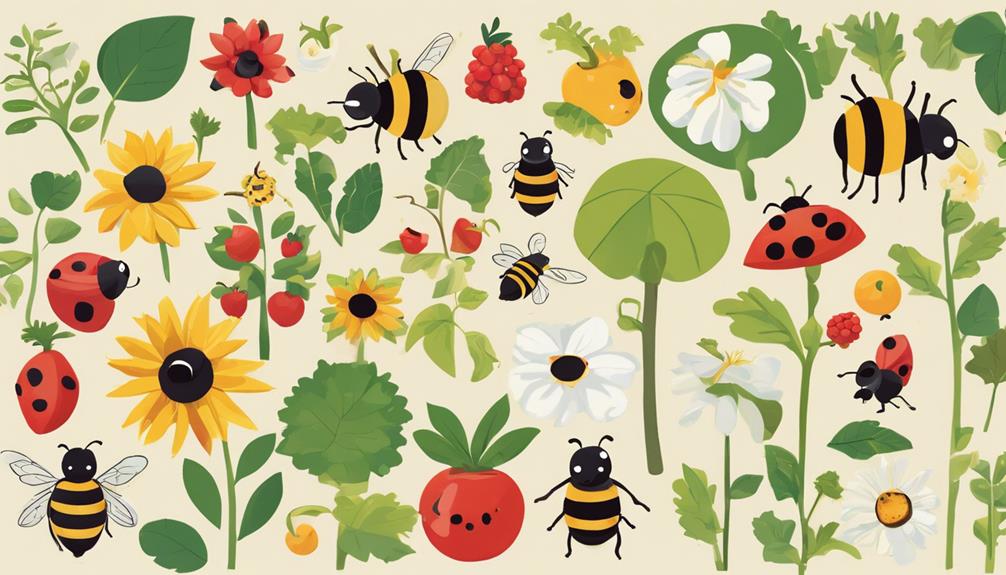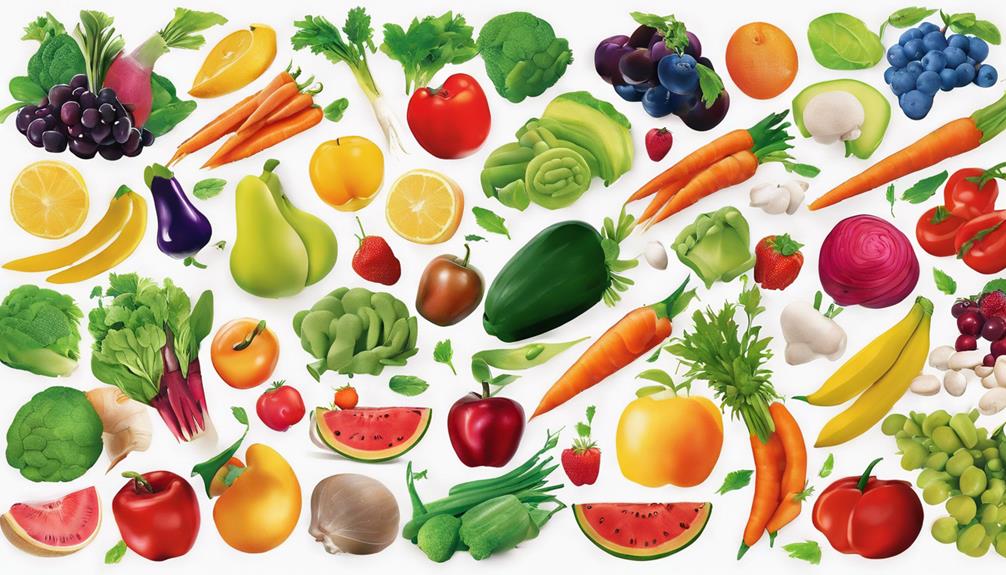10 Reasons Consumers Favor Naturally Grown Foods
Consumers favor naturally grown foods for various reasons. They provide vital nutrients, lower disease risks, aid in weight management, and boast high fiber for digestion support. Environmentally, they reduce waste, have a smaller carbon footprint, promote biodiversity, and conserve water. Concerns about pesticides drive demand for naturally grown foods which also offer a more authentic, seasonal taste. Ethical concerns regarding animal welfare play a key role in consumer choices. Supporting food security, sustainability, GMO-free options, nutrient density, and food safety are additional reasons for the growing preference. These factors collectively contribute to the rising popularity of naturally grown foods.
Health Benefits
Consumers are increasingly choosing naturally grown foods due to the well-documented health benefits associated with them. These foods play a crucial role in disease prevention and boosting the immune system. Naturally grown foods are packed with essential vitamins, minerals, and antioxidants that help strengthen the body's defense mechanisms against various illnesses. Studies have shown that a diet rich in naturally grown fruits and vegetables can lower the risk of chronic diseases such as heart disease, diabetes, and certain types of cancer.
Moreover, naturally grown foods support weight management and aid in digestion. Foods like whole grains, fruits, and vegetables are high in fiber, which promotes a feeling of fullness and helps regulate appetite. This can be instrumental in controlling weight and preventing obesity, a condition linked to numerous health issues. Additionally, the fiber content in these foods supports healthy digestion by preventing constipation and promoting gut health through the growth of beneficial bacteria in the intestines.
Environmental Impact
With the increasing demand for naturally grown foods driven by their health benefits, it's imperative to consider their environmental impact on sustainable agriculture practices. When it comes to environmentally friendly farming practices, naturally grown foods offer several advantages that contribute to reducing waste and lowering the carbon footprint.
- Reduced Waste: Naturally grown foods often involve organic farming methods that focus on enhancing soil health and biodiversity. By avoiding synthetic pesticides and fertilizers, these practices help reduce agricultural runoff and soil erosion, leading to more sustainable land use.
- Lower Carbon Footprint: Compared to conventional farming, naturally grown foods typically have a lower carbon footprint. This is due to the reduced use of energy-intensive synthetic inputs and transportation costs associated with chemical pesticides and fertilizers. Additionally, organic farming practices such as crop rotation and composting help sequester carbon in the soil, further mitigating greenhouse gas emissions.
- Enhanced Ecosystem Health: By promoting biodiversity and natural pest control mechanisms, naturally grown foods support a healthier ecosystem. This can lead to long-term sustainability by reducing the reliance on external inputs and fostering resilient agricultural systems.
- Water Conservation: Sustainable agriculture practices utilized in naturally grown food production often emphasize efficient water management techniques. By reducing water waste and promoting soil health, these methods contribute to conserving water resources for future generations.
Pesticide Concerns
Amid growing concerns about pesticide usage in agriculture, understanding the impact of these chemical substances on food production and consumption is crucial for informed decision-making. Pesticides, while aiding in pest control, can have detrimental effects on soil health and biodiversity. Excessive pesticide application can lead to soil degradation, affecting the long-term sustainability of agriculture.
When pesticides are used extensively, they can disrupt the natural balance of ecosystems, impacting essential organisms like earthworms and beneficial insects. Organic farming practices, such as crop rotation, help maintain soil health without relying on synthetic chemicals. Farmers adhering to organic certification standards often employ integrated pest management strategies that minimize pesticide usage while promoting natural pest predators.
Consumers are increasingly concerned about the residues of these chemicals on food products and their potential health effects. By choosing naturally grown foods, individuals mitigate the risk of pesticide exposure and support environmentally friendly farming practices. Moreover, opting for products from farms that prioritize soil health through sustainable methods like crop rotation can lead to better overall ecosystem resilience.
As awareness grows regarding the impact of pesticides on the environment and human health, the demand for naturally grown foods continues to rise. Consumers are recognizing the importance of supporting farmers who prioritize organic certification and sustainable farmer practices to ensure food quality and environmental preservation.
Better Taste
Enhancing the flavor profile of naturally grown foods often results from the absence of synthetic additives and the preservation of intrinsic qualities through sustainable farming practices. This focus on quality over quantity not only benefits the environment but also elevates the taste of the final product, providing you with a more satisfying culinary experience.
- Pure Ingredients: Naturally grown foods are cultivated without synthetic pesticides or fertilizers, allowing the true flavors of the produce to shine through without being masked by chemical residues.
- Seasonal Variability: Since naturally grown foods are often produced locally and seasonally, you get to experience a wider range of flavors throughout the year, enhancing your culinary satisfaction.
- Soil Health: Sustainable farming practices prioritize soil health, which in turn leads to nutrient-rich produce that's more flavorful and vibrant in taste.
- Traditional Methods: Many naturally grown foods are cultivated using traditional farming methods that have been passed down through generations, resulting in products that are full of authentic flavors and textures.
Animal Welfare
Cultivating a preference for naturally grown foods often extends to considerations of animal welfare in food production practices. Consumers increasingly seek ethically sourced products, with a growing awareness of the importance of humane treatment of animals in the food industry. Ethical concerns regarding the treatment of animals in food production have become a significant factor driving consumer choices.
Several studies have shown that a substantial portion of consumers are willing to pay a premium for products that ensure the humane treatment of animals. A survey conducted by the Food Marketing Institute revealed that 47% of consumers consider the ethical treatment of animals an essential factor in their purchasing decisions. This indicates a strong consumer demand for products that align with their values of compassion and ethical responsibility towards animals.
Furthermore, certifications such as 'Certified Humane' and 'Animal Welfare Approved' have gained popularity as consumers actively seek out products bearing these labels. These certifications provide assurance that the animals involved in food production were raised in environments that meet specific welfare standards. As a result, consumers are increasingly gravitating towards brands and products that prioritize animal welfare, reflecting a broader societal shift towards more ethical and sustainable consumption habits.
Support Local Farmers
Local farmers receive substantial support from consumers who prioritize sustainability and community connections in their food choices. By choosing to support local farmers, consumers not only gain access to fresh produce but also contribute to the economic growth of their communities. Here are some reasons why supporting local farmers has become a popular choice:
- Community Support: When you buy from local farmers, you're directly supporting families and individuals in your community. This support helps them sustain their livelihoods and continue farming practices that benefit the local environment.
- Economic Impact: Your decision to purchase from local farmers has a significant economic impact on your community. It helps create jobs, boost local economies, and contributes to the overall prosperity of the region.
- Quality Assurance: Local farmers often prioritize quality over quantity. By buying from them, you can be assured of fresh, high-quality produce that's grown with care and attention to detail.
- Food Security: Supporting local farmers also contributes to food security in your region. By reducing reliance on food imports, local farming helps ensure a stable and secure food supply for the community.
Sustainability

By supporting local farmers who prioritize sustainability, you inherently contribute to the broader conversation on environmental impact and resource management within the food industry. Eco-friendly practices and conservation efforts are crucial components of sustainable agriculture. Local farmers often employ methods such as crop rotation, natural pest control, and minimal chemical usage to maintain soil health and biodiversity. These practices not only benefit the environment but also enhance the quality of the produce you consume.
When you choose to buy from farmers who prioritize sustainability, you're also indirectly reducing the carbon footprint and greenhouse gas emissions associated with food production. Sustainable farming methods generally require less energy input and result in lower emissions compared to conventional agriculture. By supporting sustainable practices, you're playing a part in mitigating climate change and promoting a more environmentally friendly food system.
Furthermore, sustainability in agriculture extends beyond just environmental considerations; it also encompasses social and economic aspects. By supporting local farmers committed to sustainability, you're helping to bolster local economies, preserve farmland for future generations, and promote a more resilient and equitable food system. Your choice to prioritize sustainability in food consumption has far-reaching positive impacts on both the environment and society.
GMO-Free
Consumers increasingly seek out GMO-free foods due to concerns about potential health risks and environmental impacts associated with genetically modified organisms.
When it comes to GMO-free foods, there are several key factors to consider:
- Nutritional Content: Many consumers believe that GMO-free foods have a higher nutritional content compared to genetically modified options. While research on this topic is ongoing, some studies suggest that certain nutrients may be altered in genetically modified crops, leading to the perception that GMO-free foods are more nutritious.
- Labeling Requirements: The demand for GMO-free foods has led to increased pressure for clear labeling requirements. Consumers want to easily identify products that are free from genetically modified organisms to make informed choices about the food they consume. As a result, many food manufacturers now label their products as 'Non-GMO' to cater to this growing consumer preference.
- Health Concerns: Some consumers are worried about the potential health risks associated with consuming genetically modified organisms. While regulatory bodies assert that GMOs are safe for consumption, the debate surrounding their long-term health effects continues to fuel the demand for GMO-free options.
- Environmental Impacts: Another reason consumers opt for GMO-free foods is their concerns about the environmental impacts of genetically modified crops. Some worry about the effects of GMOs on biodiversity, soil health, and the overall ecosystem. By choosing GMO-free products, consumers aim to support more sustainable agricultural practices.
Nutrient Density

Nutrient density in foods is a critical factor influencing consumer preferences for healthier dietary choices. When it comes to naturally grown foods, one of the key contributors to their high nutrient density is the quality of soil health. Organic farming practices that focus on maintaining soil health tend to produce crops with higher levels of essential vitamins, minerals, and antioxidants. These nutrients are then passed on to consumers through the food they eat, making naturally grown foods a popular choice among health-conscious individuals.
Organic certification plays a significant role in ensuring nutrient density in naturally grown foods. Farmers who adhere to organic standards are required to follow specific practices that promote soil health, such as avoiding synthetic pesticides and fertilizers. This leads to a more balanced and diverse soil microbiome, which in turn supports the optimal growth of nutrient-rich crops. Consumers who value nutrient density in their food often look for products that bear the organic certification label as a guarantee of higher nutritional quality.
Research has shown that foods grown in nutrient-rich soils have higher levels of vitamins, minerals, and phytonutrients compared to conventionally grown counterparts. By prioritizing nutrient density through soil health and organic certification, consumers can make more informed choices to support their overall health and well-being.
Food Safety
The quality of soil health directly impacts the safety of foods consumed by individuals who prioritize naturally grown products. When it comes to food safety, consumers who choose naturally grown foods are often drawn to them due to their perceived benefits in this area. Here are some key points to consider:
- Farming Practices: Naturally grown foods are typically cultivated using organic farming practices that avoid the use of synthetic pesticides and fertilizers. This aspect resonates with consumers who believe that these practices lead to safer food products.
- Regulation Compliance: Organic farmers must adhere to strict regulations set by certifying bodies to maintain their organic status. This regulatory oversight provides consumers with a sense of assurance regarding the safety of the foods they're consuming.
- Consumer Perception: Many consumers view naturally grown foods as inherently safer due to the absence of synthetic chemicals. This perception drives their preference for these products over conventionally grown alternatives.
- Industry Standards: The organic food industry has established rigorous standards that producers must meet to label their products as organic. These industry standards contribute to the overall perception of safety associated with naturally grown foods.
Conclusion
In conclusion, consumers prefer naturally grown foods for a variety of reasons, including health benefits, environmental impact, and pesticide concerns.
They value the better taste, animal welfare, and sustainability associated with these products.
Additionally, the assurance of being GMO-free, nutrient-dense, and safe to consume further solidify their preference for naturally grown foods.
Overall, these factors contribute to the growing demand for organic and natural food options in the market.
